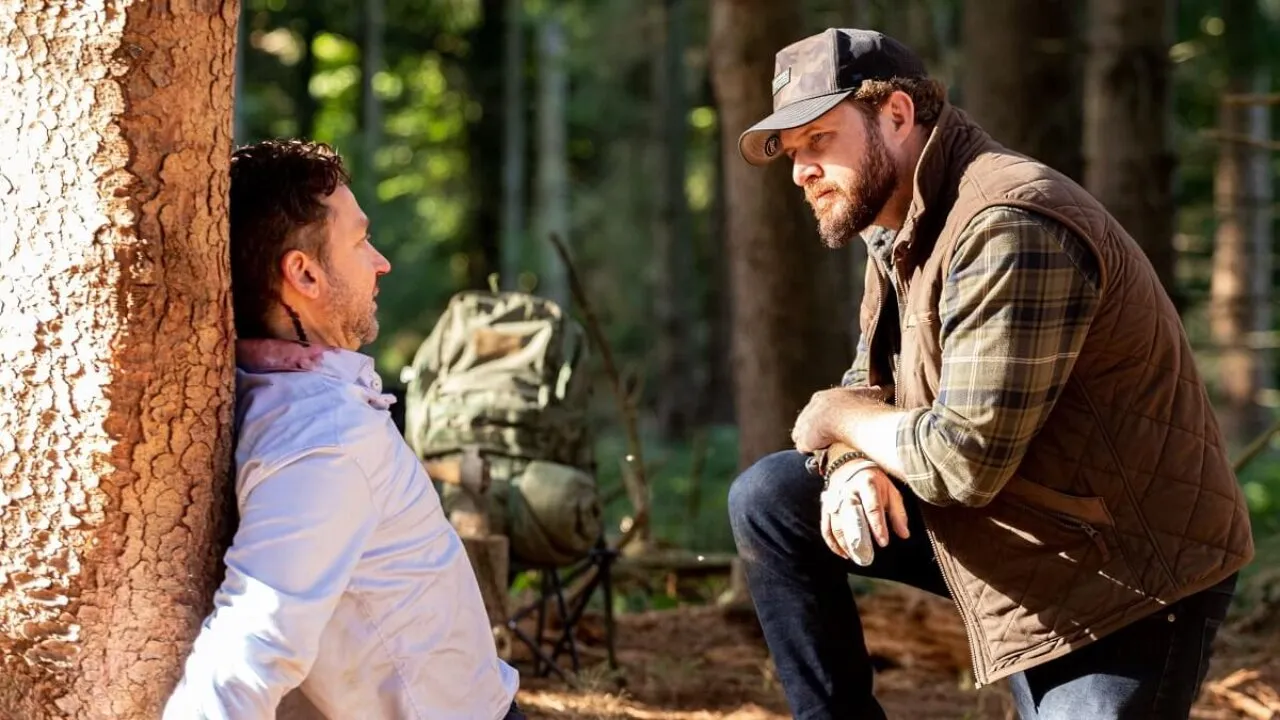To awaken is to confront the self, but what if the self you confront is a stranger? Bark begins not with a plot, but with a primal state of being: a man, Nolan, finds his consciousness returning to him while his body is bound to a tree. He is a wound in the heart of an indifferent forest, a fragment of a forgotten life. The initial horror is not the ropes or the thirst, but the profound blankness of the why.
This is existence stripped to its most basic, terrifying question. Into this void walks another man, an Outdoorsman, who sees the predicament and offers no salvation. His refusal is a quiet tear in the fabric of human expectation, a chilling declaration that the rules of society have been suspended. The stage is set not for a story of survival, but for a dissection of a soul, where the only escape route appears to be through memory itself.
The Verdant Cage
The genius of Marc Schöllerman’s direction is its power to turn an open wilderness into a cell. The forest breathes, a living entity of profound beauty, yet its lushness becomes a form of mockery. The camera’s gaze is both intimate and cruel.
It stays close to Nolan, mapping the geography of his terror, forcing us to feel the rough bark against his skin, the agonizing limit of his reach. We are made complicit in his confinement. Then, the perspective will shift, pulling back to reveal a voyeuristic distance, as if some silent, arboreal judgment is being passed.
The details of Nolan’s former life—a fine watch, expensive shoes now soiled—are artifacts from another world, the shed skin of a civilized man. Here, in nature’s amoral theater, they mean nothing. The air is thick with tension, a soundscape of rustling leaves and snapping twigs that promises either rescue or the final, quiet approach of fate.
A Duet of Veiled Truths
The film’s heart is a two-person psalm, a harrowing dialogue between prisoner and keeper. What unfolds is a psychological excavation. Michael Weston’s Nolan is a portrait of pathetic humanity; he begs, reasons, and performs the role of the victim with a conviction that feels achingly real.
We see in him a reflection of our own fragile assumptions of safety and innocence. Opposite him, A.J. Buckley’s Outdoorsman is a figure of terrifying stillness. He is not merely a captor but a mirror, a Socratic tormentor whose questions are designed to peel back the layers of Nolan’s constructed self.
His performance is a masterpiece of restraint, a simmering contempt that leaks from his eyes. The chemistry between them is electric, a friction that ignites the slow-burning narrative. Each man withholds, each man probes, and in their spare, calculated exchanges, we witness a man being forced to account for a life he believed was his own.
The Unveiling of Consequence
A film that spends its time building a case for our empathy is a powerful thing. Bark builds this case meticulously, only to pivot with a final act that is less a twist and more a profound moral re-calibration. The slow, patient unfolding of the narrative is not a weakness; it is the sharpening of a blade.
The ending arrives and re-frames every moment that came before it, turning our carefully cultivated compassion into a lens for a much harsher truth. The film weaponizes our sympathy, using it to illuminate the shadows in the man we thought we knew.
What is left is not the clean satisfaction of a puzzle solved, but the unsettling resonance of a debt being paid. It is a haunting exploration of justice in a world that often has none, suggesting that sometimes, the deepest wilderness is the one a person carries inside them.
Full Credits
Director: Marc Schölermann
Writers: Steve Fauquier
Producers: Marc Schölermann, Alexander Steinhoff, Tarik Heitmann, Beth Holmes
Cast: Michael Weston, A. J. Buckley, Ricky Watson, Lennon Sickels, Joana Vinogradoff, Crazy Horse
Director of Photography (Cinematographer): Peter Meyer
Editors: Sören Görth
Composer: Boris Salchow
The Review
Bark
Bark is a masterful, slow-burn psychological crucible that transforms a simple premise into a profound exploration of memory, self, and consequence. It expertly builds and then weaponizes audience empathy, culminating in a final, haunting recalibration of justice that lingers long after the credits roll. A taut, intelligent, and deeply unsettling piece of filmmaking.
PROS
- Intense, captivating performances from the two lead actors.
- Masterful creation of a claustrophobic and tense atmosphere.
- A powerful, thought-provoking ending that recontextualizes the entire film.
- Stunning cinematography that makes the setting a character in itself.
CONS
- The deliberate slow pace may feel repetitive to some viewers.
- Its heavy reliance on dialogue and psychological tension might not suit all tastes.
